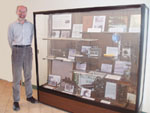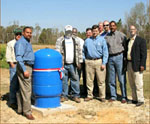|
| |
 
The Natural Resources Conservation Service —
Helping People Help the Land.
Subscribe to NRCS This Week
| NRCS This Week Articles Index |
NRCS
This Week Archives |
Contact Us |
Where to Get Information
|
eNotes from
NACD |
 TSP Express
(Requires
Adobe Acrobat.) TSP Express
(Requires
Adobe Acrobat.)

 Preserving
Farmland to Protect Family Traditions Preserving
Farmland to Protect Family Traditions
Through its largest Farm and Ranchlands Protection Program (FRPP) easement to
date, NRCS in Virginia, Fauquier County, and the Piedmont Environment Council
are preserving 740 acres of prime farmland in one of the fastest developing
counties in the State.
 NRCS
History Display NRCS
History Display
In fall 2005, Maine NRCS State Conservationist Joyce Swartzendruber envisioned
celebrating the agency’s 70th anniversary by asking cultural resources
specialist Gary Shaffer to produce a permanent exhibit depicting the history of
the agency.
 Chief
Knight Visits the Magnolia State Chief
Knight Visits the Magnolia State
NRCS Chief Bruce Knight recently visited Mississippi to help cut the ribbon for
a well and irrigation system on the farm of Donnie Travis near Petal,
Mississippi. The project was funded though NRCS Environmental Quality Incentives
Program Small Farmer/Limited Resource Initiative that Donnie applied for last
year in order to be able to irrigate vegetables during drought conditions.
Connect to
NRCS' State
News,
Newsroom, and
News Releases!

 Noted
NRCS Alum Departed Noted
NRCS Alum Departed
One of NRCS's most famous alumni, Luna Leopold, son of Aldo Leopold, recently
passed away at age 90. His first job with the agency was as an engineer in
1936 working in the (then) new field of hydrology.
Read the text of his obituary that appeared March 5, 2006, in the Washington
Post.
 March
is Women's History Month March
is Women's History Month
The 2006 theme, Women: Builders of Communities and Dreams, honors the spirit
of possibility and hopes set in motion by generations of women in their creation
of communities and their encouragement of dreams.
Find out more...
Presidential Proclamation for Women’s History Month 2006
National Women’s History Project
Executive Women in Government

 NRCS
District Conservationists Recognized NRCS
District Conservationists Recognized
NRCS district conservationists James Sperry, Colorado; Michael Welshko, New
York; and Craig O’Dell, South Carolina were recently recognized for their success
in working with State, Federal, and local non profit organizations to improve habitat for wild turkey and other wildlife by the
National Wild Turkey
Federation (NWTF) at their 30th National Convention and Sports Show in
Nashville, Tennessee.
The U.S. Department of Agriculture (USDA) prohibits discrimination in all its
programs and activities on the basis of race, color, national origin, age,
disability, and where applicable, sex, marital status, familial status, parental
status, religion, sexual orientation, genetic information, political beliefs,
reprisal, or because all or a part of an individual's income is derived from any
public assistance program. (Not all prohibited bases apply to all programs.)
Persons with disabilities who require alternative means for communication of
program information (Braille, large print, audiotape, etc.) should contact
USDA's TARGET Center at (202) 720-2600 (voice and TDD).
To file a complaint of discrimination write to USDA, Director, Office of Civil
Rights, 1400 Independence Avenue, S.W., Washington, D.C. 20250-9410 or call
(800) 795-3272 (voice) or (202) 720-6382 (TDD). USDA is an equal opportunity
provider and employer.
| | |


